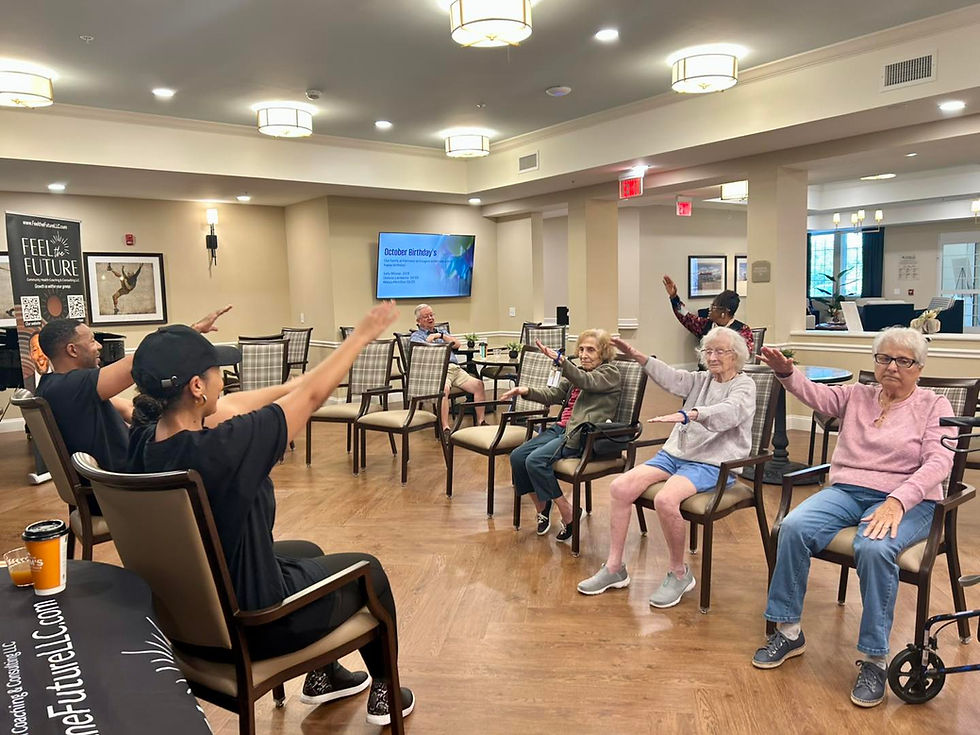Stroke is No Joke, Officially Selected for the AfroSouth Film Festival 2025
- Feel the Future, Community Health Coaching & Consulting LLC

- Sep 29, 2025
- 3 min read

We are honored to announce that our short documentary, Stroke is No Joke, has been officially selected for the AfroSouth Film Festival, taking place October 16–19, 2025, in Charleston, South Carolina. This annual festival showcases films from Black filmmakers and works that uplift stories rooted in African American, Latin, Indigenous, and other underrepresented experiences.

About the Short Documentary
Stroke is No Joke is a community health–focused short documentary (15 mins) that shares the deeply personal story of David Hannah, who survived both an ischemic and a hemorrhagic stroke at just 41 years old. David recounts the moments leading up to each stroke, the aftermath, and how the experience forever changed his outlook on life.
This film is more than one man’s story—it is a wake-up call. It highlights the dangers of unchecked high blood pressure and reminds us that serious health issues often come without warning. Stroke is No Joke is both a personal testimony and a public call to action: take your health seriously—before it’s too late.
Hypertension (High Blood Pressure) in Black Communities
To understand why David’s story must be heard far and wide, it helps to look at the broader landscape of high blood pressure in Black communities:
According to the CDC, among U.S. adults aged 18 and older, 58% of non-Hispanic Black adults have hypertension (high blood pressure), the highest rate among racial/ethnic groups.
Historically, Black adults also tend to develop high blood pressure earlier in life and often face more severe forms of the condition.
In 2024, Black or African American adults were diagnosed with hypertension 26% more frequently than the overall U.S. adult population. Office of Minority Health
From 2017 to 2020, Black adults with hypertension had their blood pressure under control 18% less often compared to the total population with hypertension. Office of Minority Health
Compounding the risk, structural and social determinants—such as limited access to quality care, food deserts, stress from systemic inequities, and environmental exposures—play a significant role in driving these disparities.
By the age of 55, research suggests 3 out of 4 Black adults may already have high blood pressure, compared to lower proportions in white populations. www.heart.org
These numbers underscore the urgency of stories like David’s—not as anomalies, but as reminders that many people are living on the edge of risk without realizing it.
Our Mission
We believe in the power of creative advocacy. Health data can be overwhelming, but personal stories cut through the noise and help us connect, reflect, and act. By bringing David’s story to the screen, we aim to raise awareness about stroke prevention, encourage conversations about stress and blood pressure management, and inspire individuals and organizations to prioritize wellness.
We are proud to see Stroke is No Joke included among the powerful voices at the AfroSouth Film Festival. This recognition not only celebrates our work but also amplifies our mission: to empower communities through storytelling, health education, and prevention.
Stay tuned for updates as we head to Charleston this October—and join us in spreading the message: your health is your future.
David Hannah & Sharece Sellem-Hannah
Co-Founders & Community Health Educators of Feel the Future, Community Health Coaching & Consulting LLC
Sources:
Centers for Disease Control and Prevention (CDC). (2024, Dec 6). Hypertension prevalence and control among adults — United States, 2021–2022. MMWR Weekly.https://www.cdc.gov/mmwr/volumes/73/wr/mm7348a5.htm
Flack, J. M., & Adekola, B. (2014). Blood pressure and the new ACC/AHA hypertension guidelines. American Journal of Hypertension, 27(9), 1183–1188.https://pmc.ncbi.nlm.nih.gov/articles/PMC4108512/
Office of Minority Health, U.S. Department of Health & Human Services. (2024). Heart disease and Black/African Americans.https://minorityhealth.hhs.gov/heart-disease-and-blackafrican-americans
American Heart Association News. (2021, Apr 15). The link between structural racism, high blood pressure, and Black people’s health.https://www.heart.org/en/news/2021/04/15/the-link-between-structural-racism-high-blood-pressure-and-black-peoples-health
.png)










Comments